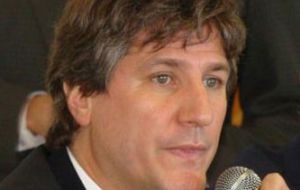MercoPress. South Atlantic News Agency
Argentina’s annual inflation estimated by private consultants in 14%
 Economy minister Boudou has promised to restore credibility to official statistics
Economy minister Boudou has promised to restore credibility to official statistics Argentine inflation was 0.7% in September according to the official controversial Statistics office, Indec. The figure released Wednesday as has been happening for years was disputed by private consultants that estimate an average between 0´9% and 1.3%.
In the last nine months retail inflation accumulates 5% while wholesale prices increased 0.8% in September totalling 6.6% since January.
However it is the third consecutive month that Indec has reported inflation that was slightly higher than in the preceding months, and some analysts say that suggests the government is trying to gradually narrow the gap with private estimates.
Economy Minister Amado Boudou, who took office in July, has vowed to restore credibility to consumer price data, which economic analysts say has underreported real inflation for more than two years.
“As last month, September prices rose strongly, 1.3% and 10.5% so far this year and 14% over September a year ago”, said the report from Ecolatina, a prestigious consultant headed by former Economy minister Roberto Lavagna.
”(September's figure) is closer to reality. Our estimate was for 0.9%, which isn't that different“ said Fausto Spotorno, an economist at consulting firm Orlando Ferreres & Asociados.
”For the whole year, we expect inflation of about 14%,“ Spotorno added.
”Today's figure did not surprise the market, but the 0.7% expectation might already have contained some expectation Indec would continue to gradually report inflation figures that come closer to the non-government estimates” Alberto Ramos, senior economist at Goldman Sachs, wrote in a report.
Graciela Bevacqua, the former head of the Indec office sacked for refusing to manipulate numbers and now runs a private consultancy, Buenos Aires City, said the inflation estimate for September was 1.2% and 10.3% in the first nine months of the year and 13.3% in the last twelve months.
For the last quarter of 2009 the Buenos Aires City consultants report anticipates two counter forces: on the one hand the recession which will help to slow inflation, but on he other “devaluation of the currency, public utilities rates’ adjustments, salaries’ negotiations and pensions, plus the need to monetize growing federal and provincial deficits” will be boosting the index. .
Clothing costs led September's price rises, climbing 1.5%, followed by education-related costs, which rose 1.1%. Food and drink prices rose 0.9%, according to the Indec release.
Argentina reported August's inflation at 0.8% while consumer prices rose 0.5% in September 2008.




Top Comments
Disclaimer & comment rulesCommenting for this story is now closed.
If you have a Facebook account, become a fan and comment on our Facebook Page!